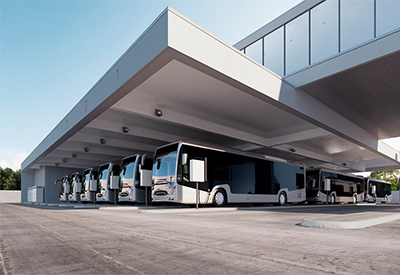ABB to power Canada’s Largest Zero-Emission all-Electric Bus Fleet

June 7, 2019
ABB recently won an order of eBus charging solutions to support TTC as it modernizes its service and introduces additional green initiatives to reach 100% zero-emissions by 2040.
The Toronto Transit Commission (TTC) operates the largest bus fleet in Canada and is the third largest transit agency in North America. As part of the TTC’s Green Bus Technology Plan, they will have 60 all-electric buses and over 255 hybrid electric buses in operation by the end of Q1 2020.
“The widespread availability of reliable and high performing charging infrastructure is key in supporting countries across the globe to meet the demands of an increasingly connected and sustainable society,” says Nathalie Pilon, President, ABB Canada. “ABB is proud to be a part of the TTC’s efforts to reduce the Toronto region’s air pollution by supplying a charging infrastructure that meets the needs of the next generation of smarter mobility.” adds Pilon.
ABB’s charging technology was developed in accordance with the CCS standard, which allows transit authorities to purchase their all-electric buses from different manufacturers. The TTC’s eBuses will be recharged at night by ABB’s HVC-Overnight Depot CCS cable connected chargers in the Arrow and Mount Dennis garages.
Scalability is vital as bus networks transition to fully electrified fleets. Having developed its fast-charging technology in partnership with leading vehicle manufacturers, ABB has designed a modular eBus solution that meets future requirements for electric vehicles (EV). This future-proof design allows for less complex and more cost-effective field upgrades for operators.
ABB has been at the forefront of EV technology for over 10 years, launching its first DC charger in 2010, its first national DC charging network in 2012 and the first electric bus charger in Europe in 2016. ABB has currently sold 10,500 DC high-speed chargers across 73 countries worldwide.
ABB’s e-mobility leadership is also demonstrated by its partnership with Formula E, the world’s first fully electric international FIA motorsport series. The ABB Formula E Championship series provides a platform to test e-mobility electrification and digitalization technologies in competitive racing. Together, ABB and Formula E are ideally positioned to push the boundaries of e-mobility.












![Guide to the Canadian Electrical Code, Part 1[i], 26th Edition– A Road Map: Section 56](https://electricalindustry.ca/wp-content/uploads/2022/11/Guide-CE-Code-2.png)



